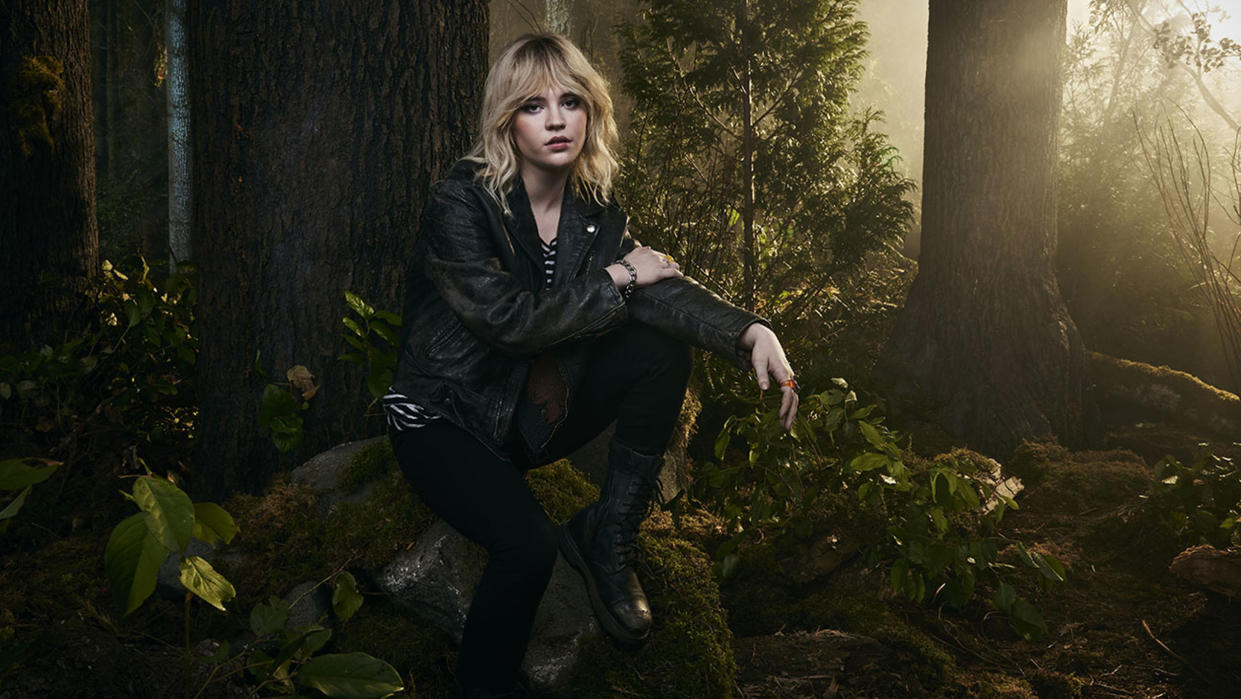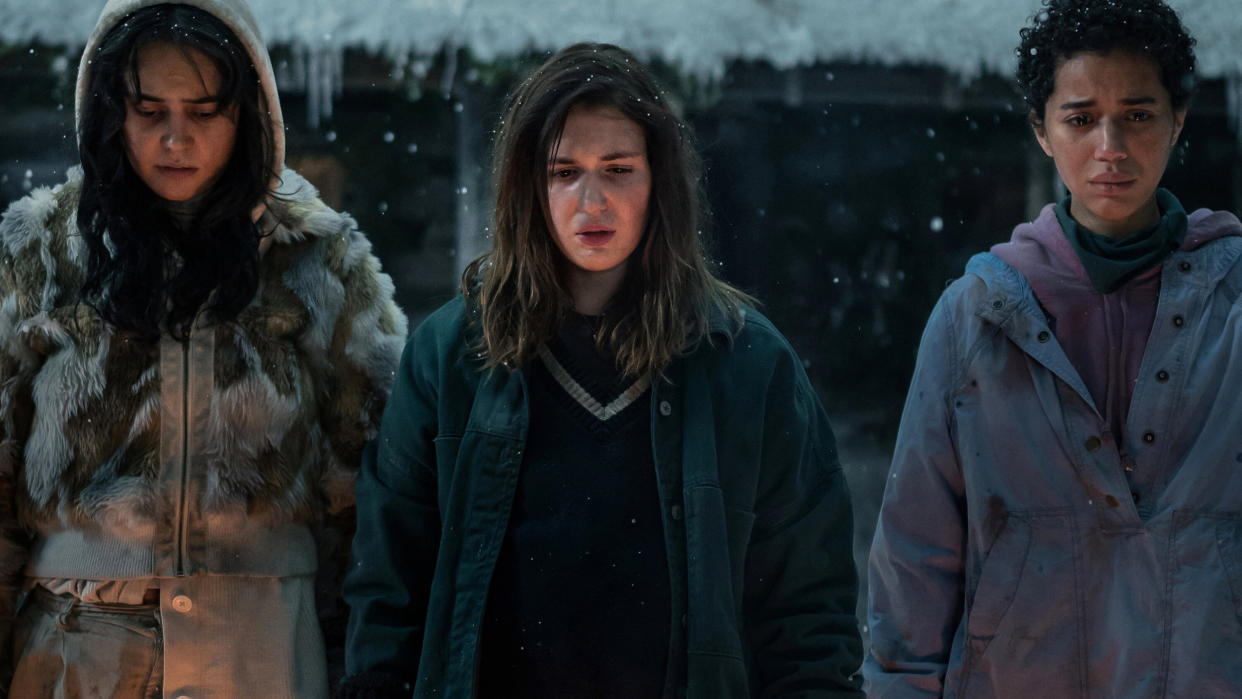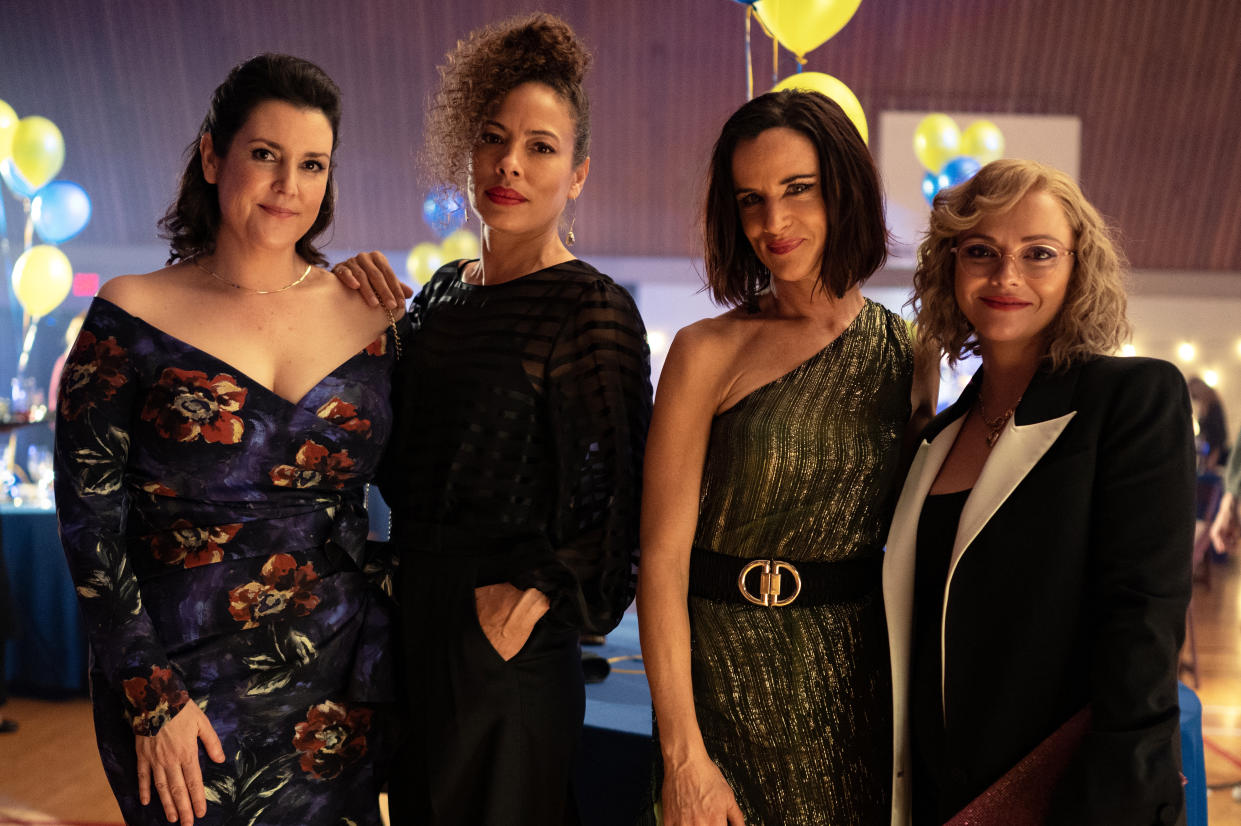For 'Yellowjackets' writers, girlhood is the scariest part
Season Two of “Yellowjackets” is just as cold and gritty as the first one. Actually, make it colder, grittier … and bloodier, as the plane crashed high schoolers head into winter, and turn to drastic means to survive.
Operating in dual timelines, the show tracks the students in the past, where every day is Girls vs. Woods, and adults, where the traumas formed in the wild are never far behind them.
Yet for all its survivalist, surreal plots, “Yellowjackets” still manages to be relatable. In Season Two, the girls are falling in love and stirring up drama, even as they’re hunting moose and foraging for food. "Yellowjackets" shows that a person can do both things at once: Survive and grow up. In fact, one is contingent on the other: In order to survive, they have to grow up — as often the case.

Executive producers and writers Sarah Thompson and Ameni Rozsa say this dynamic is the heart of the show.
Speaking to TODAY.com, Thompson and Rozsa examined how typical coming-of-age experiences — the academic pressures, the cliques, and the hormones — inspired the show’s extreme story arcs.
“In Season Two (we’re) talking about normal teenage problems, but then putting the ‘Yellowjackets’ twist on it,” Thompson explains. “We did talk a lot about just normal teenage things that you go through and then what would that look like (in “Yellowjackets”) — the sort of life and death stakes. Our teenage girls are still having all of these same emotions and feelings, but it’s so much more heightened.”
To understand how the girls who once played united could fraction into social factions, Thompson says the writing team looked to sleepovers.
If you’ve ever been to a high school-age sleepover, then you know: The stakes can be high; the setting, uncharted.
As Thompson points, so often, the promise of a night filled with popcorn, great movies and secret exchanges can turn on a dime — ending in tears, slammed doors and betrayals (or, at the very least, no sleep).
“We were talking about slumber parties, and a couple of us had (similar) experiences,” Thompson recalls. “You know, where you’re with two other girlfriends, and something happens, and then your friends turn on you and then you’re stuck there with them because it’s the middle of the night and you can’t go home.”
Episode Four of this season, entitled “Old Wounds,” recreates the subtleties of a high school social upheaval.
Natalie (played by Sophie Thatcher) struggles to maintain her social capital as the grounds shift and the girls grow more desperate. While Natalie’s ability to wield a gun made her a favorite in the series’ debut season, her skepticism over Lottie’s supernatural powers makes her peers doubt her leadership abilities.
On the other hand, Season Two also charts Misty’s climb back up the social ladder after her brutal fall from popularity in the premiere (guess that’s what accidentally poisoning an entire group of people will do to you.)
Yes, they’re in extreme situations. But "Yellowjackets" also simply shows the plate tectonics of a social clique, the writers say.
“Natalie is very much sort of feeling on the outside of the group,” Thompson says. “(Now) there’s this Lottie clique of believers that is sort of forming, and Natalie just doesn’t get it. She doesn’t want to be a part of it. And it gets to a point where she is feeling on the outside, like she's losing her friends."
Of course, "Yellowjackets" a familiar dynamic to a new level. "In the woods, this normal teenage thing you would go through in high school is now, ‘Oh, what if they all turn on me and kill me out here?’”
For Rozsa, one nightmarish middle school memory became particularly influential for her work in the Season Two writers' room.
“I got randomly pantsed by a girl I didn’t know on the first day of school in the eighth grade,” she says.
With time, she looks back on what was once a traumatic moment with the curiosity of, say, a sociologist specializing in middle school hallway dynamics.
“(Now) I think, what is that, except just some weird social hierarchy thing? You spend the rest of your high school years being like, ‘Well, I hope that never happens again," Rozsa says, saying that so much of the "social dynamics of being a teenager" have to do with "demonstrating dominance over people."
Though a team member has yet to be pantsed in the series, the girls do face humiliation, albeit with the “Yellowjackets” twist that Thompson describes. Everything is always life or death.

And even in death, there’s humiliation: Shauna bites off her dead best friend’s ear, the first overt gesture to the question of cannibalism that’s always been in the background (and it's always been when, not if).
"Yellowjackets" also demonstrates the staying power of the teenage years in a person's identity. While most people don’t go through these kinds of experiences with their best friends, there’s a familiarity to Shauna and Natalie sizing each other up, years later, like they hold a key to the other's past.
As “Yellowjackets” demonstrates, the teen years often set the story of our lives, or the story we tell ourselves about ourselves. We can grow up, but we can never totally leave.

“Doctors and psychiatrists would tell you it has something to do with our prefrontal cortex not being fully developed,” Thompson explains.
“Those emotions are all so vivid and kind of so unmanageable in a way,” she adds. “I think that’s what still remains indelible to me about (my) teenage years. It’s not that I remember every event, but I remember, like, how deeply felt things were.”
Adolescence is our own personal “Yellowjackets:” No Canadian woods required.
This article was originally published on TODAY.com
